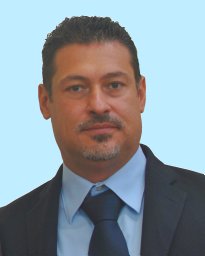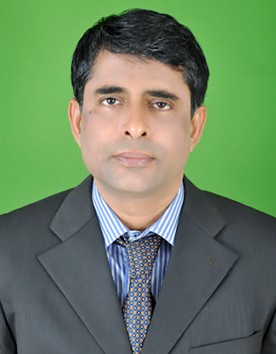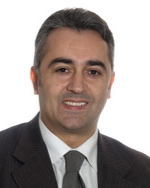Keynote Speaker Ⅰ

Prof. Giuseppe Carbone
University of Calabria, Italy & East China Jiaotong University, China
Biography: Giuseppe Carbone has got his PhD degree in Robotics from the University of Cassino, Italy, in 2004 He has been visiting professor at Universidad Carlos III of Madrid, Beihang University, Waseda University, and several other well-reputed International Research Institutions. From 2024 he has joined East China Jiaotong University. From 2020 he is Chair of IFToMM TC on Robotics and Mechatronics. From 2018 he has joined University of Calabria, Italy. From 2018 to 2021 he has been Visiting professor at Sheffield Hallam University, UK where he served as Senior Lecturer and member of the Executive board of Sheffield Robotics from 2015 to 2017. He has been Scientific Director of the International Research Laboratory Intelligent Robotic Systems and Technologies. Among others he is Editor-in-Chief of Robotica Journal (Cambridge Univ. Press), Section EIC of Journal of Bionic Engineering, MDPI Robotics, MDPI Machines, Technical Editor of IEEE/ASME Transactions on Mechatronics. He has been PI or co-PI of more than 20 projects including 7th European Framework and H2020 funds. He has received more than 20 Best Paper awards and more than 10 International Best Patent awards. His research interests cover aspects of Engineering Design, Mechanics of Robots, Mechanics of Manipulation and Grasp, Mechanics of Machinery with over 500 research paper outputs, 20 patents, and 16 Phd completions (8 ongoing). He has been also member of 20 PhD evaluation Commissions in Italy, Spain, Finland, UK, Romania, Mexico, India. He has been invited to deliver Keynote speeches and lectures on his research activity at more than 30 International events. He edited/co-edited four books that have been published by Springer and Elsevier International Publishers. h-index 40 n. citations >6000 (source google scholar). In January 2023 he received an Honoris Causa Doctoral Degree from Technical University of Cluj-Napoca (Romania). In June 2023 he received an Honoris Causa Doctoral Degree from University of Craiova (Romania).
Speech Title: Design Concepts and Examples of Embodied Intelligence in Robotic Grasping
Abstract: This presentation explores design concepts that embody intelligence within robotic grippers and hands, emphasizing how function can emerge from the integration of mechanics, sensing, and control rather than costly complexity. By prioritizing simplicity in mechanism design and modular architectures, we illustrate how grasping systems can achieve robustness and adaptability while remaining practical to build and maintain. We will examine streamlined actuation strategies—using minimal motors combined with efficient linkages—that allow reliable performance across diverse tasks. Through concrete case studies and simulation-based analyses, the presentation demonstrates how iterative prototyping and virtual testing can guide the development of grasping solutions that are both intelligent in behavior and efficient in design.
Keynote Speaker Ⅱ

Prof. Umesh Chandra Pati
National Institute of Technology, Rourkela, India
Biography: Dr. Umesh C. Pati is a Full Professor at the Department of Electronics and Communication Engineering, National Institute of Technology (NIT), Rourkela. He has obtained his B.Tech. Degree in Electrical Engineering from National Institute of Technology (NIT), Rourkela, Odisha. He received both M.Tech. and Ph.D. degrees in Electrical Engineering with specialization in Instrumentation and Image Processing, respectively, from the Indian Institute of Technology (IIT), Kharagpur. He is currently serving as Chairperson, International Students Cell, NIT Rourkela. He has also served as Head, Career Development Center, NIT Rourkela for three years.
His current areas of interest are Image/Video Processing, Computer Vision, Artificial Intelligence, Medical Imaging, Internet of Things (IoT), Industrial Automation, and Instrumentation Systems. He has authored/edited Three books and published more than 150 articles in peer-reviewed international journals as well as conference proceedings. He has served as a reviewer in a wide range of reputed international journals and conferences. He has delivered a number of Keynote/Invited Talks at various International/National platforms. Dr. Pati has filed 4 Indian patents. Besides other sponsored projects, he is currently associated with a high-value IMPRINT project, “Intelligent Surveillance Data Retriever (ISDR) for Smart City Applications,” which is an initiative of the Ministry of Education and the Ministry of Housing and Urban Affairs, Govt. of India.
He has visited countries like the USA, Italy, Austria, Australia, Singapore, Mauritius, Bangladesh, Nepal, etc., in connection with research collaboration and paper presentations. He was also an academic visitor to the Department of Electrical and Computer Engineering, San Diego State University, USA, and the Institute for Automation, University of Leoben, Austria. He is a Senior member of IEEE, Fellow of The Institution of Engineers (India), Fellow of The Institution of Electronics and Telecommunication Engineers (IETE), and life member of various professional bodies like MIR Labs (USA), The Indian Society for Technical Education, Instrument Society of India, Computer Society of India, and Odisha Bigyan Academy. His biography has been included in the 32nd edition of MARQUIS Who’s Who in the World 2015. He is also a recipient of Torchbearer of Education Award 2020 by Coding Ninjas.
Speech Title: Video-based Intrusion Detection System using Deep Learning Techniques
Abstract: There is a huge demand for video surveillance-based intelligent security systems that can automatically detect unauthorized entry or mal-intentional intrusion into the unattended sensitive areas and notify the concerned authorities in real-time. A novel video-based Intrusion Detection System (IDS) using deep learning techniques has been proposed. In this work, You Only Look Once (YOLO) algorithm is used for object detection. Then, the intrusion is detected using the proposed algorithm based on the Shifted centre of the bounding box of the detected object. Further, Simple Online and Realtime Tracking (SORT) algorithm is used for the tracking of the intruder in real-time.
The developed system is implemented and tested for live video stream using NVIDIA Jetson TX2 development platform. The proposed IDS is a generic one where the user can select the region of interest (the area to be intrusion-free) of any size as well as shape from the reference (starting) frame and potential intruders, such as a person, vehicle, etc., from the list of trained object classes. It can have a wide range of applications, like person intrusion-free zone, no vehicle entry zone, no parking zone, smart home security, etc.
Keynote Speaker Ⅲ

Prof. Giorgio Figliolini
University of Cassino and Southern Latium, Italy
Biography: Giorgio Figliolini received the Laurea Degree (5 years) in Mechanical Engineering cum laude from the University of Cassino in January 1991 by developing an experimental thesis on the Mechatronic Design and Construction of a Flexible Automatic Packaging Machine, which allowed him the winning of a Festo grant. In the same year, he got the Professional Engineering Qualification at the University of Rome, La Sapienza. After military service in Aeronautics, he started his academic activity in the October 1992, as Researcher at the Faculty of Engineering of the University of Cassino, where he became Associate Professor in the April 2002 and where, currently, he is Full Professor of Mechanics Applied to Machines, since February 2020, and Chief of LARM (Laboratory of Robotics and Mechatronics).
In 1998/99, he was visiting researcher for 6-months at CIM (Center for Intelligent Machines) of the McGill University in Montreal (Canada) by working under the supervision of Prof. Jorge Angeles and then, he specialized in 2000 on the Hydraulic Systems at the Centre for Fluid Power Transmission and Motion Control of the Bath University (U.K.).
He won the Ettore Funaioli Prize for the best scientific paper on the Mechanics of Machines at the AIMETA 2009 Conference of Ancona (Italy), the Best Award Paper in Theoretical Kinematics at the ASME 2012 Conference of Chicago (U.S.A.), the Best Award Paper – Honorable Mention at the ASME 2014 Conference of Buffalo (U.S.A.) and the Research Paper Certificate of Merit at the IFIT 2024 International Conference of Turin (Italy).
His main research interests are in the fields of the Theory of Machines and Mechanisms (TMM), Robotics and Mechatronics, for which, he has been principal investigator of several national and international research projects. He is author of about 200 scientific papers, which have been published on international Journals and proceedings of many international conferences held around the world, and he is also with Chiara Lanni, author of the book on the Mechanics Applied to Machines: applications of mechanical systems dynamics (in Italian).
Currently, he gives the courses of Mechanics Applied to Machines and Mechanisms Design, respectively for the Bachelor in Industrial Engineering (Mechanics) and the Master in Mechanical Engineering, at the University of Cassino and Southern Lazio.
Speech Title: Kinematic synthesis of linkages and higher-pair mechanisms: algorithms and applications
Abstract: This presentation is focused on the main scientific results, which have been obtained by the research activity developed in Cassino, along with several national and international scientific collaborations, on the synthesis of linkages and higher-pair mechanisms, and devoting particular attention on their algorithms and applications. More in depth, the synthesis of indexing mechanisms, quasi-constant transmission ratio and dwell linkages, six-bar motion generators with an instantaneous stop link, will be presented, along with the rigid-body guidance making use of prismatic pairs. Finally, the synthesis of higher-pair mechanisms, as cycloidal and involute gears in two and three dimensions, including some results on non-circular gears, will be presented.